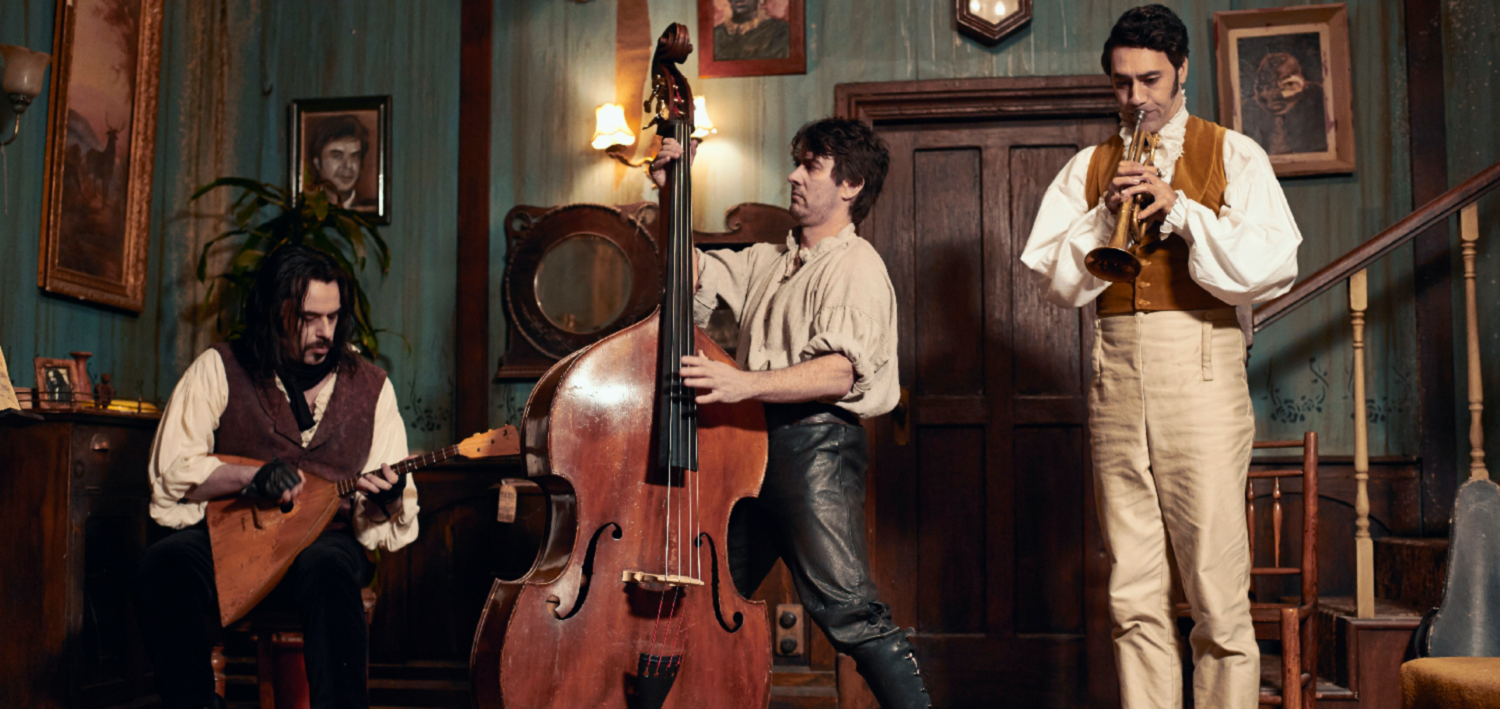
Someone here in Dungog, prior to the screening of What We Do in the Shadows had said that they were excited to see the “hipster vampire film”. Whilst that seems to be a description more apt for Jim Jarmusch’s recent Only Lovers Left Alive, Jemaine Clement and Taika Waititi’s mockumentary would at least fulfil part of that sentiment, in that it seems to actively carve out its own place in modern comedic cinema. Moving on from Flight of the Conchords and Boy, respectively, this film bursts with offbeat sensibilities and a reliance on the ability of character actors to bring laughs merely through their presence on-screen. It’s not a traditionalist comedy, using pacing and camera work more akin to television than film, but that fits with the conceptual premise – it is as much about vampires as it is a look at popular culture more generally.
The plot concerns a group of vampires from around the world who have, for one reason or another, emigrated to New Zealand and now share a flat. Viago (Waititi) is an 18th century dandy pining for his true love, Vladislav (Clement) a medieval sadist and Deacon (Jonathan Brugh), the young “bad boy” of the group. A documentary crew begins filming them in the lead-up to the ‘Unholy Masquerade’, an annual event in Wellington that is more social gathering than sacrificial ceremony. Where the plot becomes something more than mere faux-realism is in its construction of an actual narrative throughline, primarily with the character of Nick (Cori Gonzalez-Macuer), a young man who is accidentally turned into a vampire when the flatmates try to eat him. Nick joins the household and brings with him Stu (Stuart Rutherford), his best friend and an IT consultant, who helps the vampires make their way into the modern world and face the notion of a human they aren’t allowed to eat.
As expected, the performances are uniformly solid, Brugh in particular is able to make even a simple movement of his eyebrow hysterically funny, with his physicality a nice foil to much of the great dialogue in the film. Gonzalez-Macuer, as Nick, often plays the straight man in his scenes but, surprisingly, brings some of the film’s biggest laughs, essentially acting as an audience surrogate beyond the camera lens. Interactions with the pack of werewolves, led by Conchords regular Rhys Darby, are also a highlight, the construction of the supernatural world of Wellington amuses more as it expands. The external normality brought by Stu and Jackie (Jackie van Beek), a suburban housewife caught in a master/slave relationship with Deacon, is another of the film’s best features.
Mockumentaries on the whole tend to deal with targets, either of a filmmaking nature or through their characters. The film starts off by sending up passive aggressive living situations through the guise of an exaggerated series of characters, here all vampires, feeling more like a long sketch than a film. Waititi and Clement expand upon the narrative scope through the filmic form itself; a scene in which police enter the home reminds us of the presence of the documentary crew and thus inadvertently becomes a different show entirely for that brief sequence. They also effectively engage with vampires in popular culture, whether that be by riffing on Twilight to explain to people in a nightclub exactly what vampires are or through a recurring Nosferatu homage, Count Orlock is reborn as Petyr, the 8000-year-old housemate who lives in the downstairs room of the flat.
At times, though, the film feels merely like a series of sketches and, as a result, some scenes or subplots appear rushed to their comedic conclusions. In the final half-hour of the film, as the Unholy Masquerade itself approaches, the film seems to lose its focus, in particular two subplots related to romance seem weakly constructed and executed. There is also the issue of actual character arcs, which tend to fall to the wayside in favour of hitting a plot point.
The visual effects, when used, were seamless additions to each scene. Whether the vampires were flying around a room or shapeshifting in front of a convenience store attendant, it enhanced the immersion in this world through its interaction with the POV handheld cameras. The scenes intended to evoke genuine horror, whilst amusing in their execution, tended to be clearly telegraphed to the point of sapping some of the potential tension.
Since Waititi and Clement are both acting in the film as well as having written and directed it, there is a compelling sense of real independent cinema about it, a rejection of comedic norms, or at least normal conception and production.1 In this almost singular comedic voice, the film never seems to slip into indulgence, much to its credit. Regardless, What We Do in the Shadows is a huge crowd-pleaser of a film, an engaging and amusing comedy that is worth seeing.
Around the Staff
| Jess Ellicott | |
| Felix Hubble | |
| Dominic Barlow |
